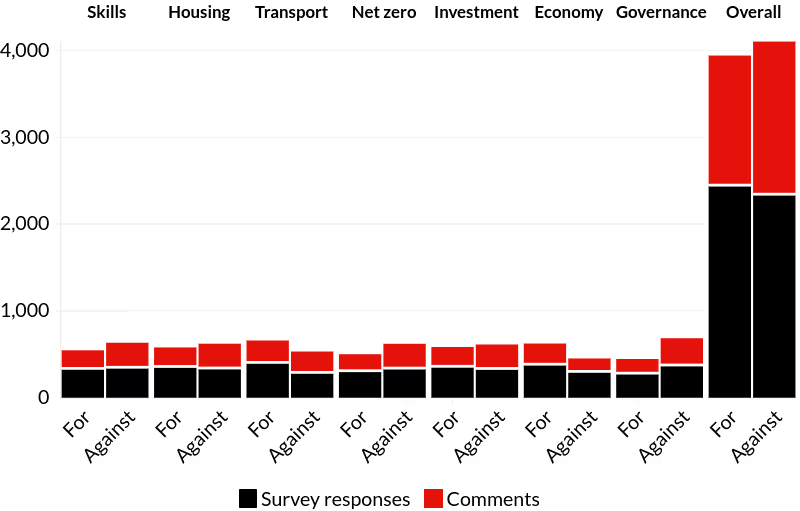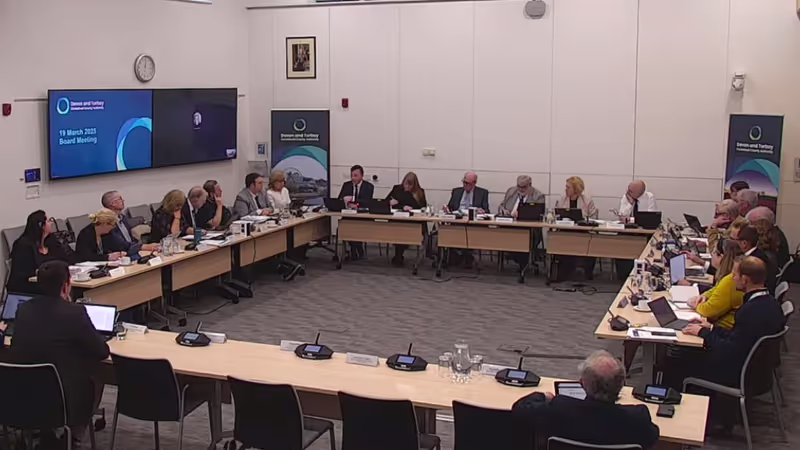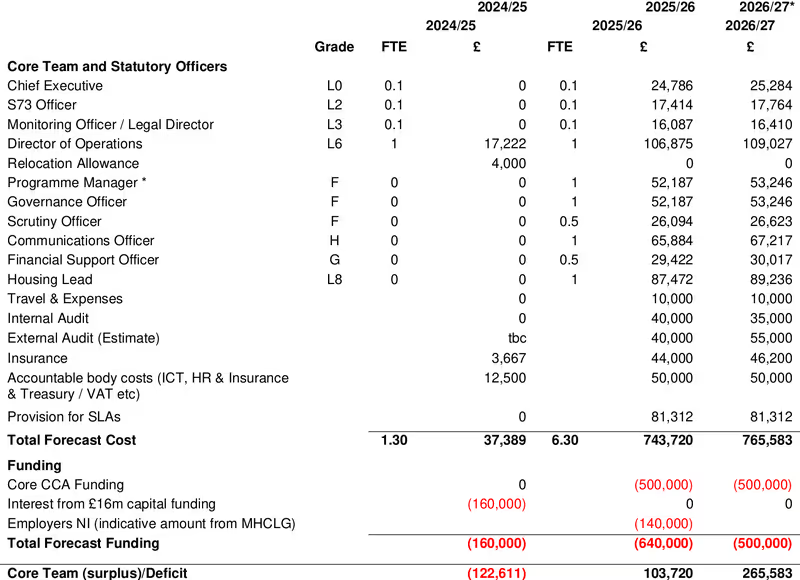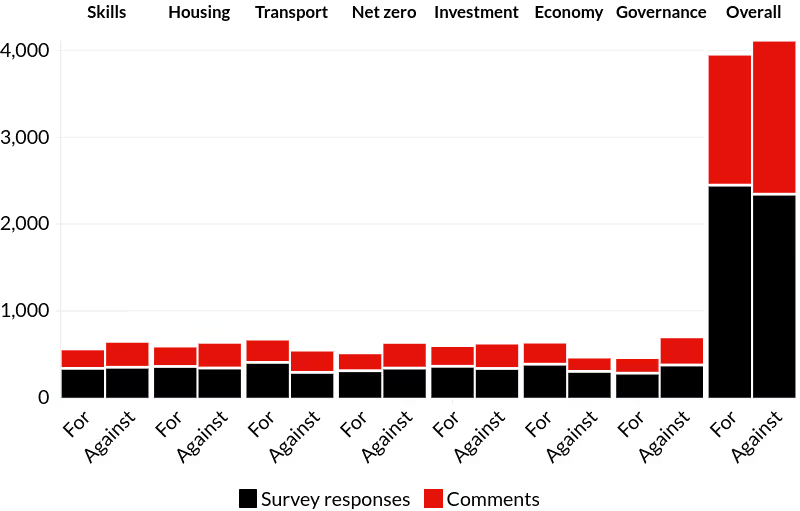When the legislation establishing Devon & Torbay Combined County Authority came into force in February, county council leader James McInnes described the event as a “monumental day” heralding a change in the relationship between Devon and Torbay and central government.
No such fanfare accompanied the first formal meeting of the new authority, which is to become the region’s future strategic governance body as part of the government’s devolution plans, when it took place in Tavistock three weeks ago, however.
Perhaps its convenors thought the new authority lacks popular appeal. It has taken control of housing and prosperity funding from Devon’s district councils, including Exeter City Council, and moved transport policy-making out of reach by creating a new, unelected layer of local government.
The devolution deal that led to its creation came with just £16 million to share between the 954,000 people it now oversees – around £16 each – and the government retains control over both the funding and the new authority’s delivery plans.
Worse still, the new authority was imposed on Devon and Torbay despite a public consultation that found a majority opposed its creation (Plymouth pulled out of negotiations in 2023). Exeter City Council said the legislation underpinning it “creates a democratic deficit for all district councils” and South Hams District Council accused it of “remoteness and lack of democratic accountability”.
 Devon County Council Devon & Torbay devolution deal consultation results
Devon County Council Devon & Torbay devolution deal consultation results
The new authority’s inaugural meeting on 19 March was, fittingly enough, witnessed by only a handful of people and largely devoted to ratifying decisions that had already been taken behind closed doors at the end of January.
These included the election of Torbay Council leader Dave Thomas as chair and Devon County Council leader James McInnes as vice-chair – both for the next two years despite James McInnes’ decision to quit as a county councillor at the local elections on 1 May.
Three more Conservative councillors were also elected as constituent members of the new authority including Rufus Gilbert, who is also quitting in May, alongside a single Liberal Democrat.
Other members, mostly without voting rights, were also appointed, alongside a list of substitutes to act as understudies in their absence.
They include Alan Dykes, chair of North Devon Plus, and South Devon College CEO Laurence Frewin. Each is intended to represent a yet-to-be-convened advisory group, one to represent business interests, the other to focus on skills and employment.
Other advisory groups are also intended, to cover housing, transport, climate change and investment. None of these groups or their chairs are electorally accountable, nor can electors directly choose who runs the new authority on the region’s behalf.
 Devon & Torbay Combined County Authority inaugural meeting
Devon & Torbay Combined County Authority inaugural meeting
The democratic deficit doesn’t end there: the new authority’s constitution does not allow the public to ask questions or make representations at its meetings.
When asked to account for this, its operations director Sean Anstee, formerly Conservative leader of Trafford Council, said that public questions and representations about Devon & Torbay Combined County Authority should be directed to the councils which are represented on its board.
However, Devon County Council, Torbay Council, Exeter City Council and East Devon District Council, all of which currently have seats, also have rules which essentially preclude this approach.
All the new authority’s constituent members were made aware of this failing before its first meeting last month but none mentioned it before they voted to ratify its constitution. Exeter City Council leader Phil Bialyk did try to bring it up but got a similarly evasive response. All Sean Anstee added was that, from what he called “a transparency perspective”, the meeting had “clearly” been live-streamed.
If, by this, he is referring to the authority’s hastily-created YouTube channel – which has three subscribers – he might want to ask himself whether, when a public meeting is held but no member of the public is present to see it, it actually takes place.
It has so far been viewed just 60 times despite taking place three weeks ago, presumably leaving about 954,000 people to convince that it ever happened.
 Devon & Torbay Combined County Authority operating budget
Devon & Torbay Combined County Authority operating budget
Still, the new authority is not short of money with which to persuade Devon and Torbay’s residents that a sea-change in regional governance occurred that day.
Its 2025-26 operating budget provides for no fewer than ten members of staff, including a communications officer that the authority apparently needs full-time at an annual cost of £66,000 – presumably for this purpose – and Mr Anstee himself, who tops the staffing costs table at £107,000.
By the time other running costs are added to the half a million pounds it will take to employ all these public servants, the new authority will need £750,000 a year just to stay afloat. (It hopes to fund the £265,000 deficit it expects by the end of next year using left-over Heart of the South West Local Enterprise Partnership money.)
What is even more remarkable about this budget is that it is difficult to identify exactly what the new authority will do in return for so much public money, at least for the next twelve months.
It is ostensibly responsible for seven workstreams. But it is not expected to take responsibility for its “emerging” adult skills programme until September 2026, and only then if the Department for Education approves it.
Its Connect to Work programme is “still being finalised”, with Devon County Council expected to continue as the programme’s accountable body “until arrangements are made” with the Department for Work and Pensions for the new authority to take over. It seems “further dialogue” is required to “understand the mechanism for the transfer at a future point”.
The budgets for Growth Hub and Careers Hub services – previously delivered by the local enterprise partnership – are yet to be confirmed and “remain subject to agreement” with the Department of Business and Trade. And Devon County Council will deliver both in any case.
The new Devon & Torbay Combined County Authority is nevertheless taking over management of Department for Transport Active Travel funding this year, although both revenue and capital budgets for this are also yet to be confirmed.
And it is to take over a £4 million UK Shared Prosperity Fund budget that has actually been confirmed. It intends to top-slice £100,000 for “management and monitoring” because it has apparently just become much more difficult to administer than it was when Devon’s district councils spent most of the money.
It also hopes to deliver a 2025-26 capital programme to follow the £16 million that Devon County Council and Torbay Council got to spend on a last year’s programme in return for agreeing the devolution deal in the first place.
But even when the government decides how much to give the new authority – and it appears likely to be just £20 million – there still doesn’t seem to be any reason why the new Devon & Torbay Combined County Authority needs so many staff to deliver so little at such colossal cost.
Read full article at source
Stay informed about this story by subscribing to our regular Newsletter



